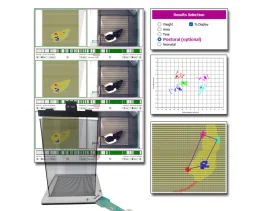Authors
Pavel Prado-Gutierrez, Anisleidy Castro-Fariñas et al.
Lab
Centro Interdisciplinario de Neurociencia de Valparaíso, Facultad de Ciencias Universidad de Valparaíso, Chile - Cuban Neuroscience Center, Havana, Cuba
Journal
Audiology research
Abstract
Generation of the auditory steady state responses (ASSR) is commonly explained by the linear combination of random background noise activity and the stationary response. Based on this model, the decrease of amplitude that occurs over the sequential averaging of epochs of the raw data has been exclusively linked to the cancelation of noise. Nevertheless, this behavior might also reflect the non-stationary response of the ASSR generators. We tested this hypothesis by characterizing the ASSR time course in rats with different auditory maturational stages. ASSR were evoked by 8-kHz tones of different supra-threshold intensities, modulated in amplitude at 115 Hz. Results show that the ASSR amplitude habituated to the sustained stimulation and that dishabituation occurred when deviant stimuli were presented. ASSR habituation increased as animals became adults, suggesting that the ability to filter acoustic stimuli with no-relevant temporal information increased with age. Results are discussed in terms of the current model of the ASSR generation and analysis procedures. They might have implications for audiometric tests designed to assess hearing in subjects who cannot provide reliable results in the psychophysical trials.
Source :
http://audiologyresearch.org/index.php/audio/article/view/113

 Douleur - Allodynie/Hyperalgésie Thermique
Douleur - Allodynie/Hyperalgésie Thermique Douleur - Spontanée - Déficit de Posture
Douleur - Spontanée - Déficit de Posture Douleur - Allodynie/Hyperalgésie Mécanique
Douleur - Allodynie/Hyperalgésie Mécanique Apprentissage/Mémoire - Attention - Addiction
Apprentissage/Mémoire - Attention - Addiction Physiologie & Recherche Respiratoire
Physiologie & Recherche Respiratoire




































 Douleur
Douleur Système Nerveux Central (SNC)
Système Nerveux Central (SNC)  Neurodégénérescence
Neurodégénérescence Système sensoriel
Système sensoriel Système moteur
Système moteur Troubles de l'humeur
Troubles de l'humeur Autres pathologies
Autres pathologies Système musculaire
Système musculaire Articulations
Articulations Métabolisme
Métabolisme Thématiques transversales
Thématiques transversales Congrès & Meetings
Congrès & Meetings